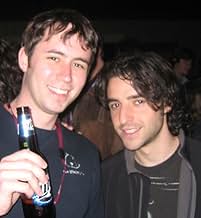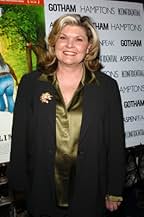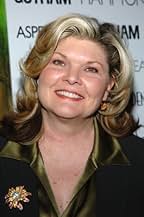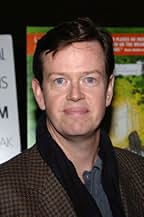Aviva is thirteen, awkward and sensitive. Her mother Joyce is warm and loving, as is her father, Steve, a regular guy who does have a fierce temper from time to time. The film revolves aroun... Read allAviva is thirteen, awkward and sensitive. Her mother Joyce is warm and loving, as is her father, Steve, a regular guy who does have a fierce temper from time to time. The film revolves around her family, friends and neighbors.Aviva is thirteen, awkward and sensitive. Her mother Joyce is warm and loving, as is her father, Steve, a regular guy who does have a fierce temper from time to time. The film revolves around her family, friends and neighbors.
- Awards
- 3 nominations total
- Director
- Writer
- All cast & crew
- Production, box office & more at IMDbPro
Featured reviews
Solondz Continues to Push the Envelope
Many times Solondz's films are misunderstood. They are often deemed sacrilegious, vulgar, or plainly disgusting. If you are one of these people shame on you, Solondz simply explores and exploits major issues that happen everyday. No other director besides Larry Clark is bold enough to do this. Personally, I think the dialogue in Solondz's films is brilliant and witty. He chooses tasteful casts that depict their characters perfectly. The audience is able to easily relate to the characters or simply hate them. I praise Solondz for his work.
These people are real
I think this is a great movie for people with daughters. If this movie doesn't make you want to be a better parent then I guess there is no hope after all. Well, I'm finally closing in on 200 words, I could have definitely stopped after saying "people had to laugh because if they didn't they would have to cry."
A Fascinating Visual Experiment on Hot Button Issues
Very parallel to Alexander Payne's "Citizen Ruth" in covering some of the same territory about abortion, writer/director Todd Solontz mostly eschews that film's satire and easy jabs for a protean look at an issue that has a more complicated emotional landscape than advocates on either side usually concede.
He does this by literally taking us inside the mind of a young malleable adolescent who intentionally gets pregnant and is surprised at the reactions of those around her. Sometimes we see her as she sees herself, as if we are reading her diary, with her body-hating hopes for a change in hair, skin, age or family, and sometimes we see her as others see her.
Every one wants to control "Aviva" and their hypocritical selfishness is laid bare, regardless of their various good intentions. Her mother sees her still as a baby (a welcome back to the screen for Ellen Barkin who manages to add maternal warmth to hostile dialog) to the discomfiting sexualization (Britney-ization?) of just barely teens that is just barely a step above pedophilia, to how she is seen by pro-life advocates (whose Sunshine Band for "special children" seems almost as exploitative as JonBenet Ramsey's performances) and on in a picaresque dream scape that crosses a nightmare that is a bit extreme, especially for fans of "Welcome to the Dollhouse."
Solontz pulls this off by having every image of "Aviva" (according to the director's production notes) "portrayed by two women, four girls (13-14 years old), one 12-year-old boy, and one 6-year old girl" of widely variant size, shape, color and just about every other possible outward characteristic, even though one haranguer points out that no one can ever really change.
Solontz in a hand-out at the theater defined his use of the title as meaning "a condition of stasis and/or immutability; that part of one's personality or character that resists change, stays the same," but I'm not sure that successfully comes through in this provocative film, especially with some of the acerbic dialog and disturbing actions.
Nathan Larson's music is appropriately eerie, with spooky vocalizations by Nina Persson.
Releasing the film without a rating will probably keep it from being seen by young teens which is too bad as it is a frank and fresh look at the pressures on girls from friends, family and society.
Solondz Has Certainly Not Taken the Easy Option
I've seen a lot of strange films in my life, but this has to be right up there. Compared to this, "Happiness" was a crowd-pleasing knockabout comedy. I have to say that I found "Palindromes" hard going, even boring at times, although there was definitely a slow burn quality and by the end I was pretty much drawn in.
The film plays rather like a cross between Luis Bunuel and a live action "South Park". The multiple-actress technique pioneered in "That Obscure Object of Desire", deadpan style and flat picture quality on the one hand, taboo-breaking humour, song 'n' dance and perverse exploration of moral issues on the other.
I wonder what a conservative audience would make of this film. My guess is that it's aimed squarely at a liberal audience, but it absolutely refuses to pander to liberal prejudice, instead laying into the "pro-choice" position in a manner which can only be described as destruction testing. I get the feeling that Solondz is challenging his own opinions on the issue, as much as ours. Pro-lifers might see the storyline as vindicating their beliefs, but I dare say would be so horrified by other aspects of the film that they wouldn't make it to the end.
This is probably Solondz' bleakest movie to date, despite moments of (very dark) humour. Scientific rationalism is weighed against religious fundamentalism and both are found utterly wanting.
Incidentally there is no rape in this film, despite comments elsewhere, although there are certainly very disturbing scenes.
A brave movie, overall. I'm sure Solondz could take the David Lynch/John Waters route towards the (relative) mainstream with considerable success, but "Palindromes" sees him driving determinedly in the opposite direction, in every respect.
Worth seeing, even if Solondz scares you.
Did you know
- TriviaHeather Matarazzo turned down reprising the role of Dawn Wiener in this film.
- GoofsAviva is cradling a baby doll in her hands, then her mother comes in and they talk, and Aviva puts the doll down on the bed. During the conversation the doll's clothes change and the doll's position also changes a few times during the scene.
- Quotes
Mama Sunshine Aviva: Last year, our special daughter Nainika ran away and... she didn't even have any legs. She wanted to return to her birthplace in India. Poor child. She didn't even make it as far as India, Tennessee.
- Crazy creditsIn loving memory of Dawn Wiener.
- ConnectionsFeatured in Cavities (2004)
- SoundtracksLullaby
(Aviva's and Henrietta's Theme)
Written by Nathan Larson
Performed by Nina Persson and Nathan Larson
- How long is Palindromes?Powered by Alexa
Details
- Release date
- Country of origin
- Languages
- Also known as
- Palíndromos
- Filming locations
- Kingston, New York, USA(Restaurant & parking lot scene with Bob & Aviva. Superlodge 129 Route 28)
- Production company
- See more company credits at IMDbPro
Box office
- Gross US & Canada
- $553,368
- Opening weekend US & Canada
- $57,251
- Apr 17, 2005
- Gross worldwide
- $809,686
- Runtime
- 1h 40m(100 min)
- Color
- Sound mix
- Aspect ratio
- 1.85 : 1







































